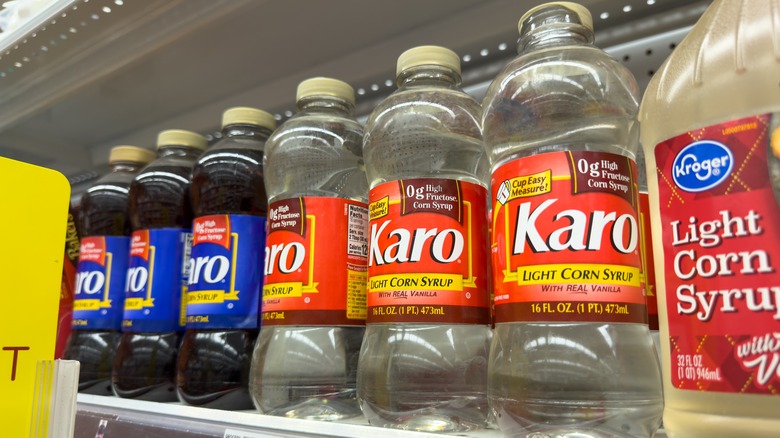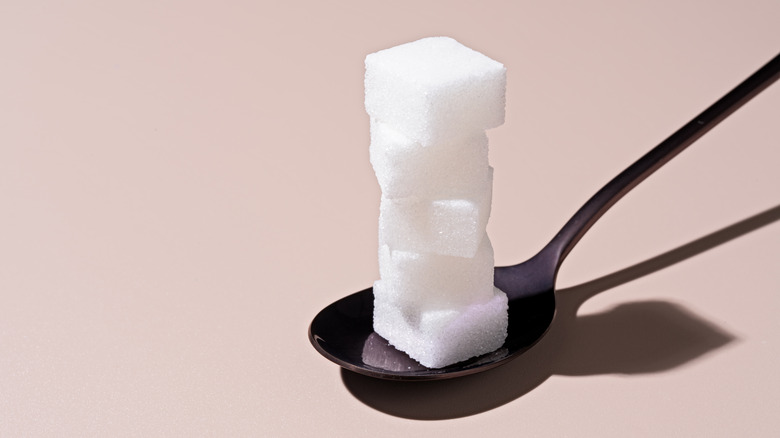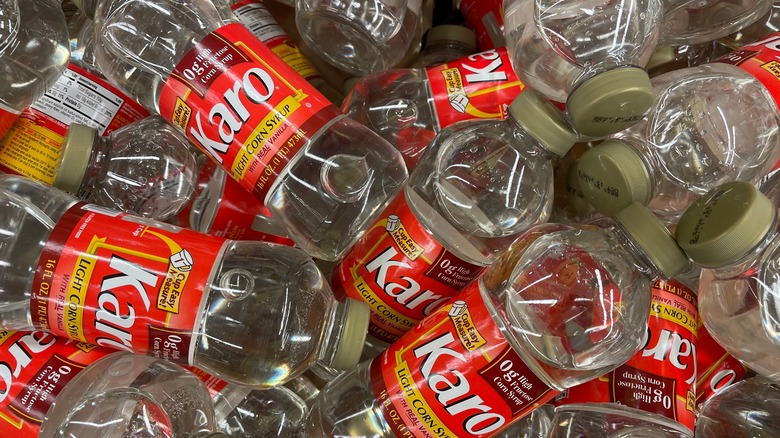The Problem With Using Corn Syrup As A Substitute For Table Sugar
Whether you're an experienced baker or experimenting in the kitchen, you may have encountered recipes that call for corn syrup, and you've definitely seen recipes that call for granulated sugar (aka table sugar). But what happens if you only have one and not the other? Can they be substituted? This dilemma is common because, while both are sweeteners, their roles in recipes are quite different.
Corn syrup is a liquid sweetener made from corn starch, commonly used in processed foods and as a key ingredient in candy and other sweets. Unlike granulated sugar, which is crystalline and dry, corn syrup is, well, syrupy and contains up 24% water, depending on which type you're using. This difference in composition is significant and influences how corn syrup behaves in recipes. Corn syrup is popular in baking and candy-making because it prevents sugar from crystallizing, keeping things like caramels and glazes smooth. Though it's perfect for making tackier-textured foods like homemade marshmallow fluff, it can't be substituted for regular sugar in most recipes — and vice versa. The closest substitute for corn syrup itself is almost always going to be a liquid.
Its higher water content, lower sweetness level, and distinct chemical properties mean that it doesn't always perform well as a straightforward substitute for granulated sugar. Understanding these differences is crucial before deciding to replace sugar with corn syrup in your recipes. Whether you're a seasoned baker or just experimenting in the kitchen, knowing how corn syrup can alter the outcome of your dish is essential for achieving the desired results.
Corn syrup has a higher water content than granulated sugar
It's obvious why corn syrup and table sugar can't be direct substitutes of one another: Granulated sugar is a solid, and corn syrup is a liquid. This extra moisture can significantly alter the texture and consistency of your baked goods or candies. Even though corn starch can be useful in baking, corn syrup isn't always a help. For example, if you swap sugar for corn syrup in a cookie recipe, you might find that your cookies spread more than expected, or that cakes turn out denser and more moist than desired.
To balance this, you'd need to reduce the liquid content elsewhere in your recipe, which isn't always straightforward. This adjustment process can be tricky, especially for recipes that rely on precise measurements, like cakes or meringues. The added complexity of managing moisture levels makes corn syrup less ideal as a sugar substitute in many cases. Instead of a quick and easy swap, using corn syrup often requires a more nuanced approach, with careful consideration of how the overall recipe might need to be tweaked to accommodate the extra water content.
Corn syrup is actually less sweet than table sugar
Beyond its impact on moisture, another significant drawback of using corn syrup as a sugar substitute is its lower sweetness level. You may be surprised to find that corn syrup is only 30-50% as sweet as granulated sugar, meaning you'd need to use much more of it to achieve the same level of sweetness in your recipes. This can be tricky because increasing the amount of corn syrup introduces even more liquid into your dish, further complicating the texture and potentially making your desserts too wet.
This lower sweetness is particularly challenging in recipes that rely on sugar not just for sweetness, but also for structure and browning, like in cookies, cakes, or candies. Additionally, in cooking techniques that require sugar crystallization, such as candy-making, corn syrup doesn't behave the same way as sugar. Its lack of crystallization can lead to different textures and outcomes, making it unsuitable for certain types of candies, like fudge or brittle. For these reasons, many cooks and bakers prefer using solid sugar substitutes like honey, maple sugar, or coconut sugar, which offer a more reliable swap without the added complications that come with using corn syrup.


